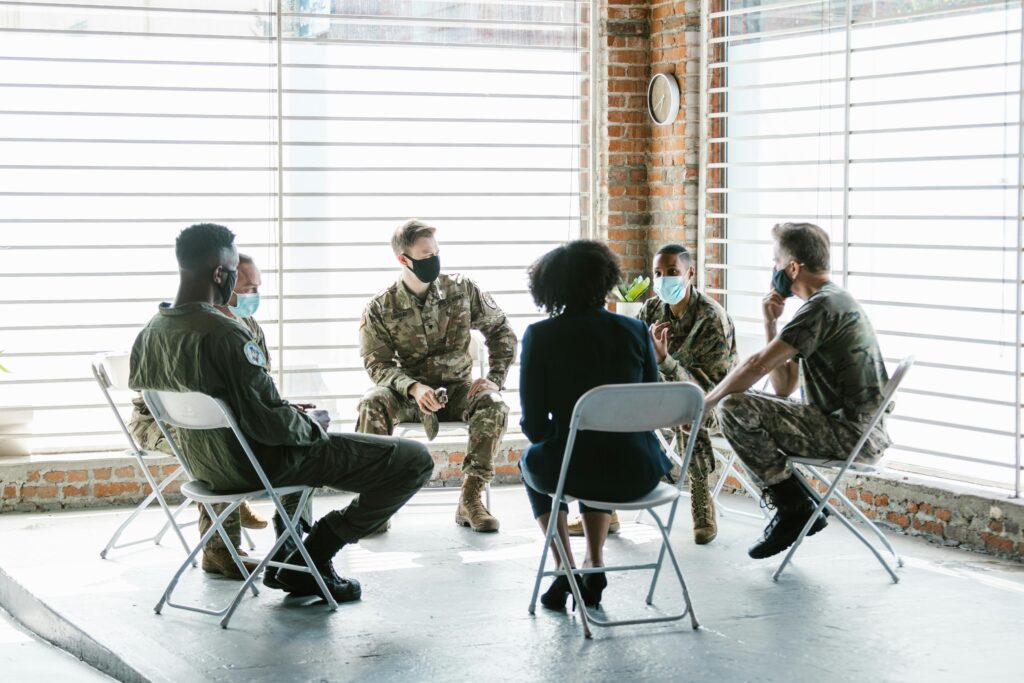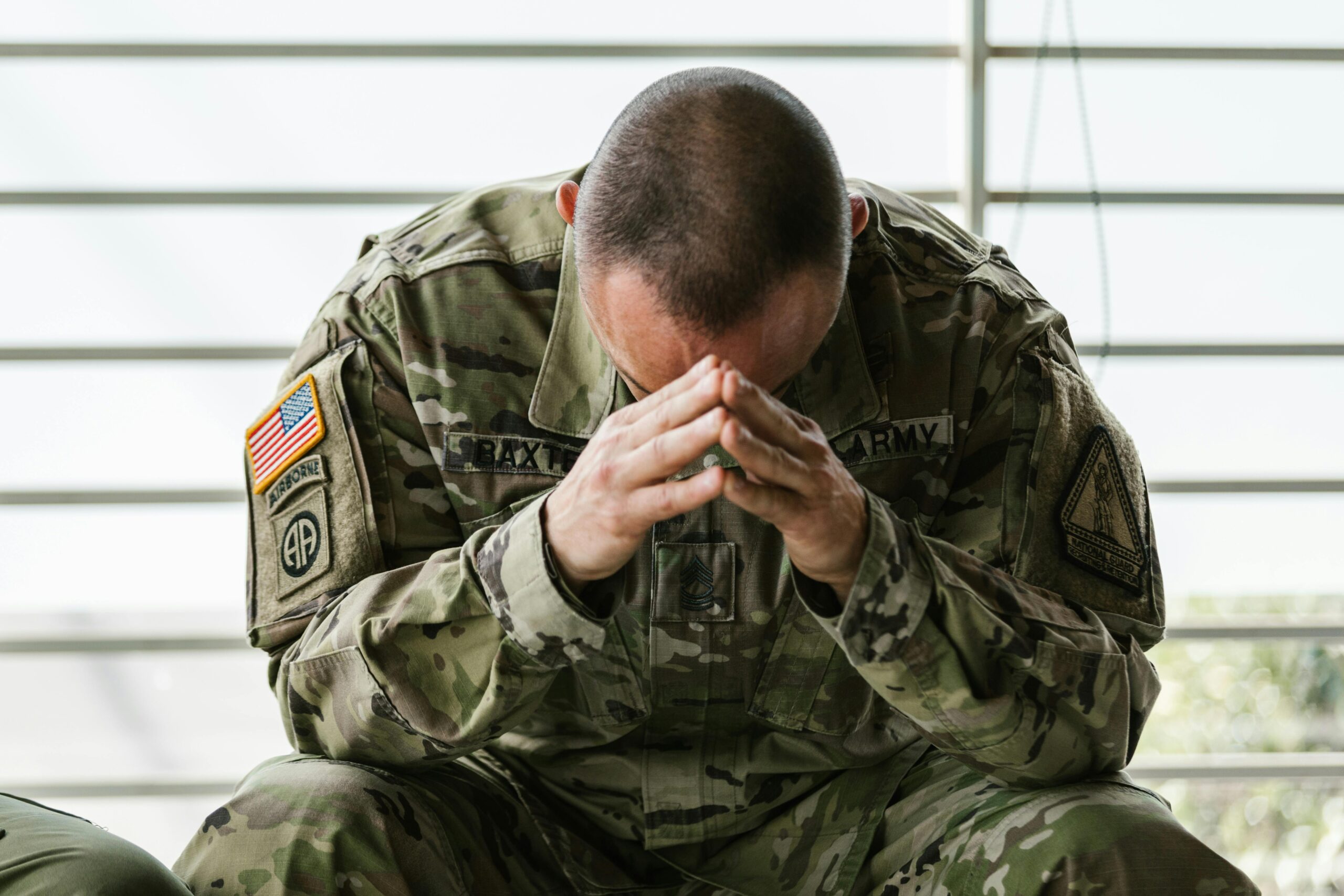If you’re a Veteran in crisis or concerned about one, connect with our caring, qualified Veterans Crisis Line responders for confidential help. Many of them are Veterans themselves. This service is private, free, and available 24/7.
To connect with a Veterans Crisis Line responder anytime, day or night:
- Dial 988, then press 1.
- Text 838255
- If you have hearing loss, call TTY:800-799-4889.
You can also:
- Call 911.
- Go to the nearest emergency room.
- Go directly to your nearest VA medical center. It doesn’t matter what your discharge status is or if you’re enrolled in VA health care.
Any life transition has ups and downs, and for veterans, the transition back to civilian life is complex. While many veterans (with time and support) can successfully navigate the transition back to civilian life, there can be significant challenges in the process. Reintegrating and navigating changes in their families, job searches… Even in the best scenario, it’s not an easy task.
Exposure to combat and/or other high-stress situations is likely to impact a person’s mental health. That, in turn, often affects relationships – almost a third of Afghanistan and Iraq War veterans reported difficulties in relationships with their romantic partners1.
In this article, we’ll explore the impact of (military) PTSD on marriage, and begin to unwind the complexity involved. Plus, we’ll offer some insights and support for those experiencing this situation.
What is PTSD?
Posttraumatic stress disorder (PTSD)2 may develop when someone lives through or witnesses a life-threatening event or one in which they believe their physical safety was significantly threatened. After the event, the person may experience or show:
- Flashbacks, recurrent dreams/nightmares
- Intrusive recollections
- Increased avoidance of triggers
- Flashbacks where they feel as if the event is recurring
- Marked physiological reactions to triggers (e.g., increased heart rate, sweating profusely, eye pupil dilation)
- Negative beliefs about self and/or others
- Persistent negative emotional state (e.g., fear, anger, shame)
- Detachment from others
- Difficulties experiencing positive emotions
- Irritable behavior or angry outbursts
- Reckless or self-destructive behavior
- Hypervigilance
- Exaggerated startle response
- Problems with concentration
- Sleep disturbance
PTSD can develop from any traumatic event, but for this article, we’ll be focusing on PTSD that develops from exposure to traumatic events during military services.
Prevalence of PTSD Among Military Personnel
The prevalence of PTSD within the military community is a significant concern. The unique challenges faced by service members, such as multiple deployments and exposure to combat, contribute to higher rates of PTSD compared to the general population.
PTSD can then be a key contributor to reduced quality of life for a veteran. It can also create or add to a variety of problems in daily life3. The National Center for PTSD noted that, at some point in their life, 7 out of every 100 veterans will have PTSD. PTSD is also more common among female veterans (13 out of 100).
It’s also important to note that the prevalence of PTSD among veterans varies based on their service era (e.g., WWII, Vietnam War, Desert Storm, OIF, and OEF). For veterans returning from Operations Iraqi Freedom (OIF) and Enduring Freedom (OEF), it is seen that 29 out of 100 show PTSD at some point in their life4.
How can PTSD affect my relationship?
PTSD can manifest in various ways, and it affects not only the individual but their relationships as well. Studies have shown that symptoms such as dissociation, numbing or avoidance, and hypervigilance are connected to greater relationship dysfunction5. While avoidance can be an effective coping strategy in a limited context, these behaviors and symptoms are really hurtful for intimate relationships6 – they can lead to communication breakdowns and increased emotional distance.
Many partners and spouses have shared that they feel helpless – unable to understand or help their partner. These feelings and frustrations can grow and cycle into something that feels impossible to address.
Research has documented the effectiveness of communication, particularly self-disclosure, in the veteran population with PTSD. It’s been seen that when veterans disclose their experience during service, it’s correlated with better relationship outcomes8. However, this is not always an easy thing – many veterans resist sharing about their experiences because they may be afraid of risking their own mental health or may be trying to protect their loved ones.
Factors Influencing Marriage Survival
What can help increase the probability that your marriage survives? Here are a few things to consider:
Early Diagnosis and Intervention
Early diagnosis and intervention play a pivotal role in the prognosis of military PTSD. Recognizing the signs and seeking professional help at the onset of symptoms can significantly improve outcomes for both the individual and the relationship.
Support Systems for Military Families
The availability of support systems for military families is crucial. These may include military-specific mental health resources, community programs, and accessible counseling services tailored to the unique challenges faced by military couples.
Resilience and Coping Strategies for Couples
Building resilience is essential for couples navigating the complexities of military PTSD. Developing coping strategies together, fostering mutual understanding, and actively participating in each other’s healing processes contribute to the overall resilience of the marriage.
What Can We Do?
If you or your spouse believe either of you may be experiencing PTSD, we highly recommend you seek out professional services, learn about PTSD, provide a safe space for communication, and practice self-care.

Seeking Professional Support
Mental health services are available through the VA. If you’re already using VA medical services, ask your primary care provider to help you make an appointment with a VA mental health provider.
If you’re not already using VA medical services, contact your nearest VA medical center or Vet Center to talk about your needs. You can find your nearest VA medical center or Vet Center here.
One treatment intervention the VA utilizes is called Cognitive Processing Therapy (CPT) services for PTSD; you can learn more about it on their website. Essentially, it relies on the disclosure of traumatic events in a formal therapeutic setting to help facilitate beneficial cognitive and emotional processing. It also has a component that brings in spouses and/or family members to support the process.
Other interventions (such as Prolonged Exposure therapy and Eye Movement Desensitization and Reprocessing) are available, as well as medication options, as appropriate.
Couples counseling is also a valuable resource. It provides a safe space for open communication, addresses relationship dynamics, and helps spouses understand and support each other effectively. Here, a couple can learn and practice disclosing to each other vulnerably and responding empathetically.
Provide a Safe Space for Communication
Research has shown that self-disclosure about combat-related experiences helps increase a spouse’s understanding and, in turn, decreases the veteran’s PTSD symptoms. That disclosure is beneficial when it’s done in a supportive and intimate relationship (disclosure in a non-ideal environment can actually do more harm to the individual).
How do you create that safe space? Respond empathetically. Active listening and validation go a long way.
Learn about PTSD
Understanding the condition, its symptoms, and treatment options fosters empathy and facilitates a more informed approach to providing support. The VA provides a great handbook to begin that education.
Self-Care for Both Partners
Prioritizing self-care is essential for both individuals in the relationship. Balancing the challenges of military life and PTSD requires a commitment to maintaining mental and emotional well-being.
You may unwittingly become a caregiver for some time as your partner’s PTSD is being treated. As they tell us on airplanes – you must first put on your oxygen mask before helping anyone else. Identify support for yourself (individual therapist, family, friends) so you can then also best support your partner.
Conclusion
In closing, navigating marriage when a partner is grappling with PTSD, particularly from military experiences, is undeniably tough. The toll it takes on relationships is real, often leaving both partners feeling lost and disconnected. But amidst the struggles, there’s hope. Early recognition, seeking help, and having a strong support network can make a world of difference. Couples who actively work together, share their burdens, learn, and care for each other, have a real shot at overcoming these challenges. It’s about creating a safe space to talk, understanding what PTSD entails, and making self-care a priority for both. Remember, reaching out for support isn’t a sign of weakness—it’s a brave move toward healing and building a stronger bond together.
Frequently Asked Questions about Marriages Surviving PTSD
Here are some commonly asked questions about PTSD and how a marriage can survive.
Q: Can military marriages truly survive the challenges of PTSD?
A: Absolutely; with the right support systems, early intervention, and open communication, many military marriages not only survive but thrive.
Q: How can spouses best support their partners with PTSD?
A: Supporting your partner in exploring treatment options, building empathetic & open communication, learning about PTSD, and maintaining your own mental health are key elements in providing effective support.
Q: Are there community programs specifically designed for military families dealing with PTSD?
A: Yes, the Veterans Association (VA) is a key organization for veterans. They will also know and can refer you to other local community programs that may offer group support, additional counseling services, workshops, and other support specifically for Veterans and their families.
Citations:
- Vogt D, Smith BN, Fox AB, Amoroso T, Taverna E, Schnurr PP. Consequences of PTSD for the work and family quality of life of female and male U.S. Afghanistan and Iraq War veterans. Soc Psychiatry Psychiatr Epidemiol. 2017 Mar;52(3):341-352. doi: 10.1007/s00127-016-1321-5. Epub 2016 Dec 31. PMID: 28040826.
- American Psychiatric Association. Diagnostic and statistical manual of mental disorders. 5th ed. Arlington, VA: American Psychiatric Association; 2013.
- Center for Substance Abuse Treatment (US). Trauma-Informed Care in Behavioral Health Services. Rockville (MD): Substance Abuse and Mental Health Services Administration (US); 2014. (Treatment Improvement Protocol (TIP) Series, No. 57.) Exhibit 1.3-4, DSM-5 Diagnostic Criteria for PTSD. Available from: https://www.ncbi.nlm.nih.gov/books/NBK207191/box/part1_ch3.box16/
- Renaud, E. F. (2008). The attachment characteristics of combat veterans with PTSD. Traumatology, 14(3), 1–12. https://doi.org/10.1177/1534765608319085
- https://www.ptsd.va.gov/understand/common/common_veterans.asp#:~:text=At%20some%20point%20in%20their,of%20100%2C%20or%206%25).
- Balderrama-Durbin, C., Snyder, D. K., Cigrang, J. A., Talcott, G. W., Tatum, J., Baker, M., Cassidy, D., Sonnek,
- S., Heyman, R. E., & Smith Slep, A. M. (2013). Combat Disclosure in Intimate Relationships: Mediating the Impact of Partner Support on Posttraumatic Stress. Journal of Family Psychology, 27 (4), 560-568.
- Cook, J. M., Riggs, D. S., Thompson, R., Coyne, J. C., & Sheikh, J. I. (2004). Posttraumatic stress disorder and current relationship functioning among World War II ex-prisoners of war. Journal of Family Psychology, 18, 36–45. doi:10.1037/0893-3200.18.1.36
- Reddy, M. K., Meis, L. A., Erbes, C. R., Polusny, M. A., & Compton, J. S. (2011). Associations among experiential avoidance, couple adjustment, and interpersonal aggression in returning Iraqi War veterans and their partners. Journal of Consulting and Clinical Psychology, 79, 515–520. doi:10.1037/a0023929

Dr. Vivian Oberling is the Founding Psychologist at Pace Groups. She is also a licensed clinical psychologist who has dedicated her career to improving the lives of clients across the lifespan. Background-wise, she’s been trained and worked in academic centers and hospitals (Stanford, Harvard, UCLA, Kaiser and Rady Children’s), and utilizes evidence-based treatments and research to enhance non-clinical, supportive services.

0 Comments